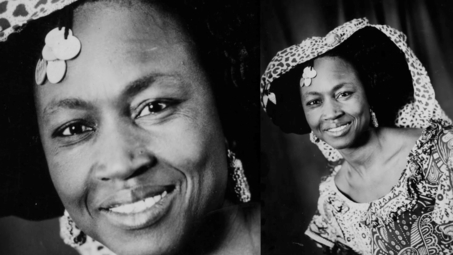About the movie "Mama Casset: African Photo": An Interview with Fototracce
Fototracce is the photographic association that is behind the production of the film African Photo : Mama Casset. Its members include its director, Elisa Mereghetti; and also Maddalena Cerletti, Melissa Nicolini and Giovanna Burinato. They answered our questions altogether !
Emmanuel Bacquet: How did you come across Mama Casset's work?
Fototracce : We got to know Mama Casset's work through the photographer's daughters, two of whom are currently living in Italy. They contacted Fototracce [an association that specialises in studying and developing photographic archives] to promote their father's work. So we came closer to Mama Casset's photographs through the testimonies of the family, who showed us what remains of his archives, which sadly were destroyed by fire in the early 1980s.
Then followed a desire to know Senegalese photography in depth, and to reconstruct the biographical and professional ups and downs of Mama Casset, as well as the social, historical and political context that made it possible for studio portrait photography to grow and prosper in Senegal.
EB: Very often, films made from Europe on African artists bring together European, white "specialists" to analyse the work. Here, you've interviewed Senegalese historians, stylists and artists, who deliver a very detailed analysis of the work and its implications. Was that a deliberate choice?
Fototracce: Yes, it was a deliberate choice. We immediately felt the need to go to the place where the photographs had been taken and to meet and question those who had known the photographer: family members, friends, collaborators, and those who, even without knowing him personally, shared his origins and had studied and appreciated his work, relating it to the history of fashion and Senegalese society.
For us it was fundamental to seek a rereading of the work of Mama Casset from within, from a "Senegalese" standpoint.
But what gave us our sense of the photographer's greatness was to see his photos in every home in Dakar, framed or carefully kept in family albums. Passed down from generation to generation just like stories, Mama Casset's images are the memories of individual families and of society as a whole.
In the documentary, the testimonies of those interviewed accompany the viewer in a journey through the Senegal of elsewhere and today, between photography, culture and society.
EB: How would you place Mama Casset's work in relation to Malian studio photographers such as Malik Sidibé, Seydou Keita? Is there a different practice of photography in Senegal?
Fototracce: Mama Casset belongs – as do other photographers such as Seydou Keyta in Mali, Cornélius Augustt Azaglo in Côte d'Ivoire and Joseph Moïse Agbojelou in Benin – to the generation of photographers from West Africa who gave birth to the great era of studio portrait photography.
After learning the technique from European photographers who worked in their country or by working themselves in the colonial army, in the 1950s each opened their own studio in their country's metropolis.
At that time, photography was assertive in the studio portraiture genre, meeting the needs of the emerging middle class in search of an identity, to then become a very popular, well-known practice.
In the photographer's studio, one witnesses the game of one's own representation. This place where desires come true is a real staging post: armed with a pose, clothes and the use of accessories (such as ties, clocks, radios and handbags), one can possess what one does not own and show oneself as one would like to be. Once the door is closed, far from outside eyes, the photographer establishes a dialogue with the client, aiming to produce a picture that can - between individual aspirations and collective imagination - capture one's identity.
You might say that the practice is the same, but each studio photographer interprets the genre of portraiture with their own style and creativity, translating data from fashion and popular tastes, as well as the influence of a modernity which gradually becomes part of everyday life.
Malik Sidibé is younger and his artistic production differs a little from the first studio photographers; by walking in the footsteps of these masters, he also knows how to show life beyond the walls of his studio, and perhaps that contributed to his international reputation.
DK2R: Were there other major Senegalese studios at the same time?
Fototracce: According to our research and what we have seen, Mama Casset's African Photo studio, which opened in 1943 in the Dakar Medina, was the most important studio in the country, and even today Mama Casset is known as Senegal's first photographer.
It doesn't matter whether he really was the first. What's certain is, Mama Casset is considered, in the collective memory, as he who gave his people an image that could represent them, by making photography an African art. His photographs are not only studio portraits, they tell the story of Senegal, its cultures, its society from the 1950s to the 1970s, a period characterised by great political and cultural unrest, between the need for deliverance and the search for a new identity.
Through his business, Mama Casset began a long family tradition, passing on his art to his brother, Salla Casset, and to his many nephews, such as Abdulaye and Mama, son of Salla Casset, who kept the business going.
DK2R: Have you planned any other films on African photographers?
Fototracce: For the time being we have no other documentary projects under way. But who knows... we would like to have the opportunity to continue our research into studio portrait photography and also to begin a new journey to discover photographers who are little known, not just African.
June 2021,
Translated from French by Henry Moon
Cover photo "African Photo : Mama Casset" ©Mama Casset


